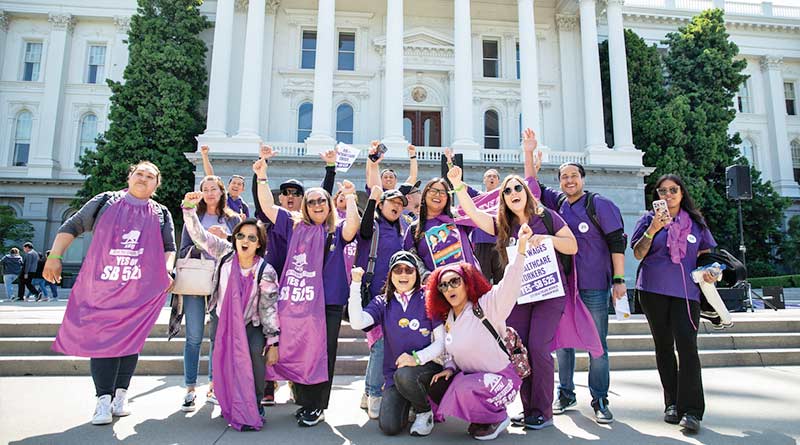Healthcare workers advance bill for living wage in state
By Sheri Williams
A bill that would raise the minimum wage for healthcare workers to $25 an hour has cleared the state Senate and now moves to the Assembly.
Senate Bill 525 by Los Angeles labor leader and Senator Maria Elena Durazo would raise the minimum wage for many healthcare workers over a two-year period. If the bill becomes law, healthcare workers would see their minimum wage raised to $21 in June 2024, then to $25 the following summer.
The bill covers workers in industries including acute care hospitals, psychiatric hospitals, medical offices, clinics, behavioral health centers, dialysis clinics, residential care centers and more. It would also cover jobs that are often held by women and people of color at lower pay, including certified nursing assistants, patient aides, technicians and food service workers.
The proposal is sponsored by SEIU California, which represents thousands of members who work in healthcare.
During the pandemic, many of those workers risked their lives to continue to do their jobs, working on the front lines of the deadly crisis. But for many, that work came with low wages and burnout—causing many to leave the industry.
California’s healthcare workforce is now in danger, with an urgent need to retain the skilled and dedicated employees who remain. Senate Bill 525 is meant to address that crisis by providing fair and living wages for healthcare workers.
“Care work has historically been undervalued by society,” SEIU said in its support letter to the California Senate. “A recent report on the California nursing home workforce characteristics found that one out of every two Skilled Nursing Facility workers earns less than $20 per hour. These workers are also primarily women (81%) and workers of color (77%), with almost half of them identified as Hispanic.”
A study by the University of California Labor Center found that, “The long hours, heavy workload, and fear of contracting the virus have harmed the mental and physical well-being of healthcare workers. A 2021 survey of healthcare providers by the California Health Care Foundation found that 6 out of 10 felt overworked and burned out, and more than two-thirds felt emotionally drained.”
The report continued, “This constant stress on healthcare workers over the past three years has led to higher turnover rates, exacerbating retention and recruitment challenges in the state’s healthcare industry.”
The California Labor Federation is also in support of the bill, according to the Senate analysis, and argues that, “The toll of the pandemic has driven healthcare workers out of the field in greater numbers than those entering it.”
“The exodus of experienced healthcare workers has turned a workforce shortage into a full-blown healthcare staffing and patient care crisis. Workforce shortages and instability result in longer wait times, decreased quality of care, and worsens existing health disparities as low-income communities of color bear the burden of staffing shortages.”
The University of California report also found that, “The proposed policy would result in significant benefits to workers and their families. We estimate that over 469,000 workers would be affected by the wage increase, including over 50,000 workers who currently earn slightly above $25 an hour but would receive a pay increase to maintain their pay premium. Affected workers would receive an average wage increase of over $5.74 per hour, or about a 30% increase in pay.”
The bill will now move on for consideration by the Assembly.
